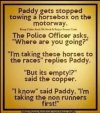On this day (May 28th) in 1754 a short skirmish took place between 75-100 French & British Colonial troops in what's now SW Pennsylvania, that basically set off a chain of events that led to the first real global conflict and established Britain as the dominant world power.
The two sides had been jostling for supremacy in North America and the British held the strategically important 'Forks of the Ohio' in what's now Pittsburgh. This spot controlled access to the Ohio River, which starts there and ultimately leads to the Mississippi. The French evicted the British from their fort and built one of their own.
The British sent out a party under a young officer called George Washington, with Native American guides, and intercepted a French group sheltering in a glen, near a place called Uniontown. The French were taken by surprise and were quickly overwhelmed. What happened next though became infamous, as Tanachrison, the Iroquois leader of the Native American guides, allegedly murdered some French prisoners.
The French weren't too pleased when they found out and sent a larger party after the British, who they cornered not far away at a hastily built fortification in a poorly chosen spot known as Fort Necessity. The British surrendered and Washington was forced to sign a document (in French) admitting to war crimes as a condition of not being taken prisoner. He wasn't held in too high regard by his British masters and was overlooked for promotion, which caused him great resentment.
Everything escalated and led to the start of what we now know as the French-Indian War (which is the backdrop for The Last of the Mohicans). Eventually other European powers got involved on one side or the other and this led to a wider conflict known as the Seven Years War. This war saw Britain effectively take control of India, under Robert Clive (Battle of Plessy and the Black Hole of Calcutta, etc.) and gain control of the hugely lucrative sugar trade in the West Indies. We also briefly occupied Manila in the Philippines. Eventually we retook Pittsburgh and built Fort Pitt, part of which is still standing and a museum.
Another result was that the Prussian ruler, Frederick the Great had started flexing his muscles and joined the British alliance, which established them as one of the Great Powers of Europe, starting the German militaristic tradition.
The expense of this war led to the colonies being taxed more heavily and eventually the Boston Tea party, which kicked off the revolution leading to the War of Independence. Washington was only too ready to get back at Britain, after what he saw as his humiliation so led the Americans and became their first President. The French were also keen to do this, and supplied the US rebels with arms, other supplies and money. There's no way they would have succeeded without this help.
That, in turn, bankrupted the French, and that was one of the main drivers for the French Revolution. That led to Napoleon and the events of the early 19th century such as Trafalgar, Waterloo, Borodino and the retreat from Moscow. You could argue that this whole sequence set off a number of other historical events, possibly including those leading to World War 1, although that was nearly 150 years after the Seven Years War, which was fought on every continent at the time.
And all because of a 15-minute skirmish 171 years ago today.




